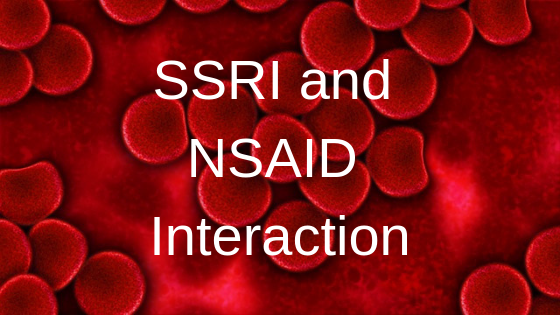The SSRI and NSAID interaction kind of drives me crazy. It is one of those interactions where you don’t really know how seriously to take it.
SSRI has the potential to impact platelet function. NSAIDs have the potential to impact platelet function. The SSRI and NSAID interaction is represented by an increased risk of bleeding with this synergistic effect.
Back to question number one. How seriously do we take this interaction, because it happens ALL THE TIME!?!? Let me break down my thought process for you.
- Are both drugs necessary? In the world of polypharmacy that I live in, getting rid of drugs is a necessity. If we can get rid of one of these drugs, this “problem” is solved. If we can’t, we need another idea.
- What are the doses and how frequently are patients using them. I’m probably more concerned with a patient on ibuprofen 800 mg TID and sertraline 200 mg than I am with a patient who takes 200 mg of ibuprofen once a month for a headache.
- What are their labs? CBC with platelets can help us identify if a patient might be at risk for bleeding and/or demonstrate if they have had blood loss.
- Are they displaying any symptoms? Bleeding or bruising is primarily what I am looking for here.
- What are their other medications? Are they on an anticoagulant like apixaban or warfarin? If so, I am much more likely to take this seriously and certainly going to try to get them off the NSAID if possible.
- Medical history. If this patient has a history of bleeding ulcers, this is not a good patient to use an NSAID in even regardless of the SSRI.
- How long have they been on these drugs? If they have done well with the combination without adverse effects, it would be harder to discontinue one of them.
- What age is the patient? NSAIDs are less tolerable in the elderly even in the absence of the SSRI.
- Which one is first to go? Usually, depression/anxiety and mental health are more challenging to get under control than pain management, but it is really going to depend upon the patient here.
Is the SSRI and NSAID Interaction Relevant
All in all, I think it is important to recognize that there is potential for a drug interaction here. In the event of a bleed or serious event, in most situations, I’m going to recommend getting off the NSAID to avoid this potential interaction.
In many situations, if the patients labs are stable and there are no signs/symptoms of blood loss, patients will continue to take these agents together.
What do you say?
- 30 medication mistakes PDF
- 18+ Page Drug Interaction PDF
- 10 Commandments of Polypharmacy Webinar based on my experiences in clinical practice



What if the patient is on oral steroid instead of NSAID, the risk of gastric bleeding will be the same?
I’ve read that celecoxib doesn’t affect platelets. So far, if I don’t see serious other risks, I’ve been overriding SSRIs with celecoxib. Is this a less risky NSAID in this interaction? Thank you.
Potentially less risky, but you must consider other factors with every patient situation. A patient on aspirin 325 mg for blood thinning effect and higher dose celecoxib may have a greater risk than a patient taking only ibuprofen 200 mg daily. I think inquiring about adverse effects like bleeding and bruising is reasonable.
Thank you, Eric, for your response. Yes, when I see any other NSAID on board, I definitely question a potential interaction risk. At mail pharmacy, we don’t have any info about labs ( unfortunately). Therefore, we either make judgments to fill from what we see in med order and history, or communicate with prescribers and ask pretty much their ok if to fill or not. I’m learning a lot from your cases in this blog.